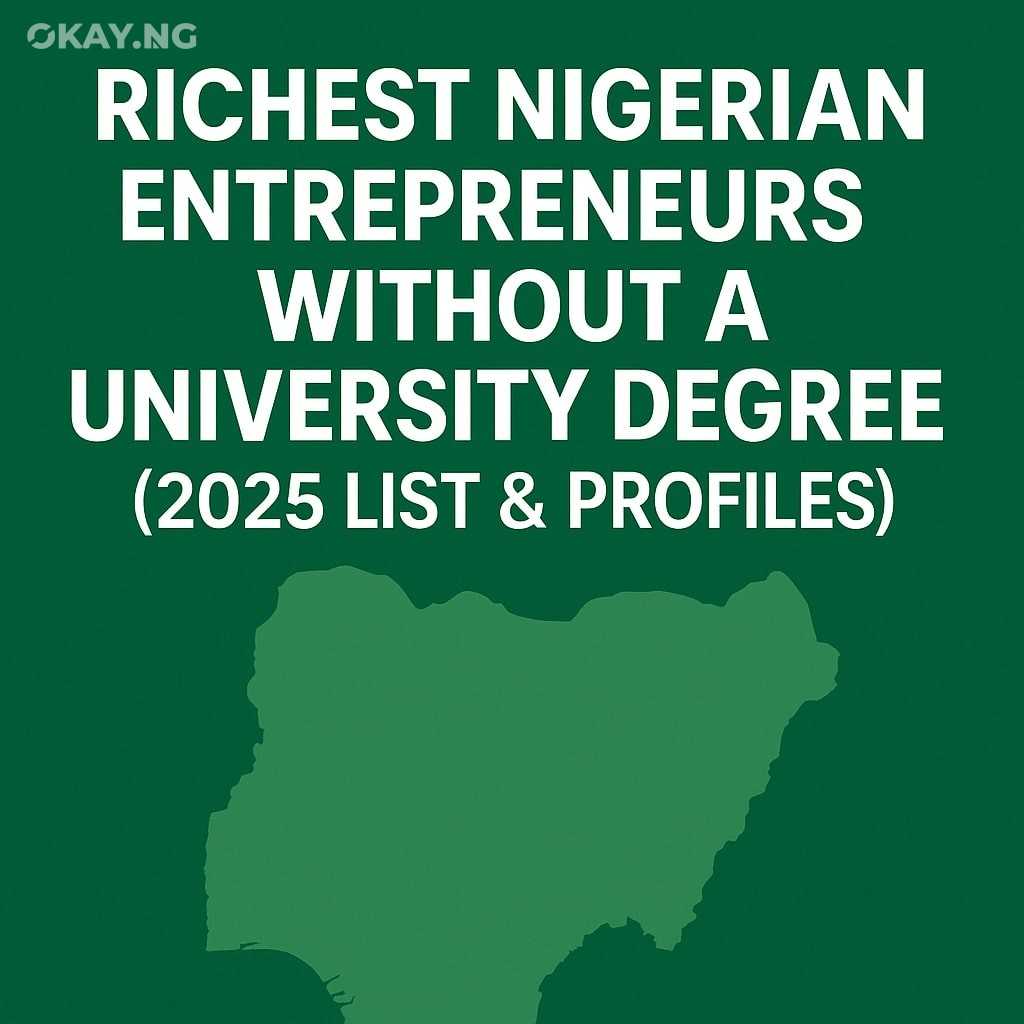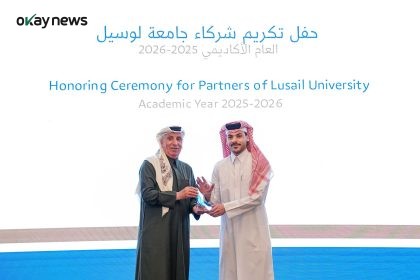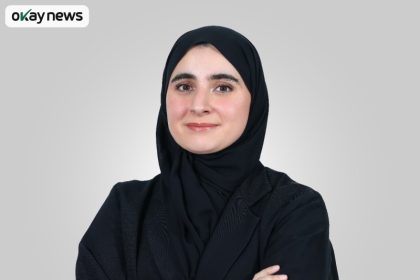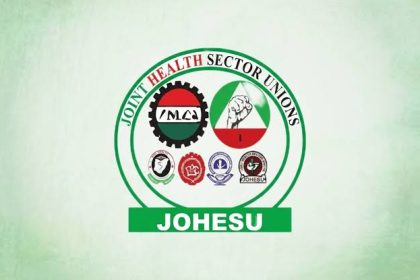A university degree helps, but it is not the only path to building a fortune. Nigeria’s business history features remarkable founders who did not complete a traditional university degree yet created national champions in energy, manufacturing, transport, retail, pharma, and tech.
This feature profiles the most famous examples, what they built, and practical lessons for young Nigerians who want to turn skills into scalable businesses.
Note: Educational histories can be complex. Some founders attended tertiary institutions, earned diplomas, or later received honorary degrees. The point here is that their wealth was built without relying on a conventional four-year university degree.
The list at a glance
| Founder | Group/Company | Sector | Why they’re notable |
|---|---|---|---|
| Femi Otedola | Zenon Petroleum; Chair, Geregu Power | Energy, power | Scaled oil marketing and invested in power generation, logistics, and finance. |
| Innocent Ifediaso Chukwuma | Innoson Vehicle Manufacturing (IVM) | Auto manufacturing | Nigeria’s flagship indigenous vehicle maker; deep local parts base. |
| Rasaq Akanni Okoya | Eleganza Group | Manufacturing, consumer goods | Built one of Africa’s largest plastic and household brands from apprenticeship roots. |
| Sir Tony Ezenna | Orange Drugs | Pharmaceuticals, FMCG | Created a pan-Nigerian pharma and personal-care distribution machine. |
| Chief Folorunsho Alakija | Famfa Oil | Energy | One of Africa’s wealthiest women; secretarial and fashion training led to oil entrepreneurship. |
| Ladi Delano | Co-founder & Co-CEO, Moove | Mobility fintech | Serial founder who scaled a vehicle-financing platform across markets. |
| Orji Uzor Kalu | SLOK Holding | Shipping, oil & gas, media | Diversified logistics and energy interests with strong regional footprint. |
| Vincent Amaechi Obianodo | Young Shall Grow Motors | Transport & logistics | From a single minibus to one of West Africa’s best-known transport brands. |
| Mohammed Indimi | Oriental Energy Resources | Energy | Upstream and midstream investments; major philanthropy in education and relief. |
| Dr. Cosmas Maduka | Coscharis Group | Auto, agriculture, tech | Started as an apprentice; built a multi-sector conglomerate and auto franchises. |
Short founder profiles (what they built and the big lesson)
1) Femi Otedola — Zenon Petroleum / Geregu Power
From diesel supply to power generation, Otedola’s playbook is scale: control logistics, secure supply, and double down on regulated, essential services.
Lesson: Own critical infrastructure in value chains people cannot live without.
2) Innocent Chukwuma — Innoson Vehicle Manufacturing
Started with motorcycle parts, grew into Nigeria’s indigenous vehicle maker with assembly plants and local components.
Lesson: Start where the market is underserved; master localization to cut costs.
3) Rasaq Okoya — Eleganza Group
Built a plastics empire by reading mass demand for household goods and pricing for volume.
Lesson: Make quality items that millions can afford; win with distribution.
4) Sir Tony Ezenna — Orange Drugs
Turned a small trading outfit into a national pharma and personal-care brand via relentless distribution and marketing.
Lesson: In fast-moving goods, availability is a superpower.
5) Chief Folorunsho Alakija — Famfa Oil
Began in fashion and admin roles, then made a decisive move into oil; later became one of Africa’s wealthiest.
Lesson: Skills from one field can unlock opportunities in another—be opportunity-driven.
6) Ladi Delano — Moove
Scaled a vehicle-financing platform that enables drivers and couriers to own income-earning assets with data-driven underwriting.
Lesson: Blend fintech + real-world assets to solve employment and mobility at scale.
7) Orji Uzor Kalu — SLOK Holding
Built diversified interests in shipping, oil services, media, and manufacturing.
Lesson: Logistics is a backbone business—own routes, fleets, and storage.
8) Vincent Obianodo — Young Shall Grow Motors
From one minibus to a regional network—famous for overnight inter-state routes.
Lesson: Reliability and fleet maintenance create unmatched customer trust.
9) Mohammed Indimi — Oriental Energy
Invested early in upstream energy and midstream assets, with visible community projects.
Lesson: Long-horizon capital and partnerships matter in heavy industry.
10) Dr. Cosmas Maduka — Coscharis Group
Left school early, apprenticed as a mechanic, grew into a multi-sector brand with auto franchises and agriculture.
Lesson: Apprenticeship + integrity can outcompete credentials.
What they all have in common
- Early apprenticeship or trading exposure: real-world learning beat classroom theory.
- Distribution obsession: ownership of trucks, depots, or routes to control costs.
- Vertical integration: from sourcing to retail; fewer middlemen, better margins.
- Talent density: hiring competent managers to professionalize family businesses.
- Risk management: compliance, insurance, and banking relationships to survive shocks.
- Community impact: philanthropy and jobs that reinforce social license to operate.
How to succeed in Nigeria without a degree (practical playbook)
- Pick a cash-flow business first: trade, services, repairs, or agency banking to build working capital.
- Master one hard skill: welding, fabrication, auto-electronics, coding, bookkeeping, or sales.
- Document everything: simple P&L, daily cash book, inventory sheets; lenders fund records, not promises.
- Join a network: trade association or chamber for bulk buying, mentorship, and dispute resolution.
- Leverage the apprenticeship model: work under a master, then agree clear settlement terms.
- Bank properly: register a business name, open a current account, adopt POS or online invoicing.
- Reinvest: prioritize assets—vans, cold rooms, molds, machines—over lifestyle spending.
- Comply early: tax ID, NAFDAC/SON where relevant, local permits—avoid seizure and fines.
- Insure your risk: goods-in-transit, fire, business interruption; one incident can erase years of profit.
- Tell your story: brand, signage, social proof; customers pay for trust.
FAQs
Do these founders have zero education?
No. Many completed secondary school, trade apprenticeships, diplomas, or short professional courses. Some later received honorary degrees. The common thread is that their fortunes were built outside a conventional university path.
Is a degree still useful?
Yes. Medicine, engineering, law, and regulated professions require formal study. This list shows that entrepreneurship can also thrive through skills, networks, and execution.
Which sectors are friendliest to non-degree founders?
Trading and distribution, transport and logistics, manufacturing, auto and repairs, agriculture and processing, retail, and certain areas of energy services.







